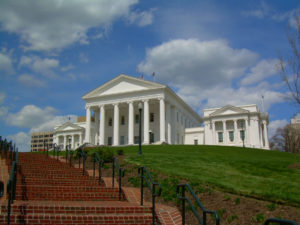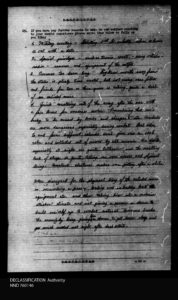This week on The Score – What happened fifty years ago at Chappaquiddick? How did World War Two soldiers respond to surveys? Will the Virginia General Assembly pass new gun laws? Is David Mamet’s new play worth a trip to London?
TheScore_July13-Full-Hour-2 [1]
Chappaquiddick Plus 50
 Fifty years ago this month, Senator Edward Kennedy of Massachusetts drove his car off a bridge on Chappaquiddick Island, resulting in the death of Mary Jo Kopechne and setting off a domino effect on his own career and American politics.
Fifty years ago this month, Senator Edward Kennedy of Massachusetts drove his car off a bridge on Chappaquiddick Island, resulting in the death of Mary Jo Kopechne and setting off a domino effect on his own career and American politics.
To look back on this anniversary, I spoke with Dr. Barbara Perry, a historian and presidential scholar at the Miller Center for Public Affairs at the University of Virginia.
Perry is author of several books on political leadership and on the Kennedy family, including Rose Kennedy: The Life and Times of a Political Matriarch [2] (2013), Jacqueline Kennedy: First Lady of the New Frontier [3] (2018), and Edward M. Kennedy: An Oral History [4] (2019). That last book, she told me, was based on nearly 30 hours of interviews granted to the Miller Center oral history project by Senator Kennedy, plus many more hours of conversations with family and staff members and other elected officials who served alongside him. You can find her on Twitter at @BarbaraPerryUVA [5].
We met at her office on Tuesday.
New Virginia Gun Regulations — or Not
Earlier this week, the Virginia General Assembly met in a special session called by Governor Ralph Northam for the purpose of considering firearms legislation. It didn’t turn out the way the Governor intended. More than one commentator equated the day’s activities to political [6] theater [7].
 The day after the special session convened and recessed, I spoke by telephone to Matthew Larosiere of the Firearms Policy Coalition. He explained what happened in Richmond and offered some thoughts on what might happen in the next few months, which will feature hearings by the Crime Commission and an unprecedented lame-duck session on November 18.
The day after the special session convened and recessed, I spoke by telephone to Matthew Larosiere of the Firearms Policy Coalition. He explained what happened in Richmond and offered some thoughts on what might happen in the next few months, which will feature hearings by the Crime Commission and an unprecedented lame-duck session on November 18.
This week, he also appeared on the Fox Business network [8] to discuss the General Assembly’s special session. His recent articles include “New York City’s Dishonest Attempt to Squelch a Gun-Rights Lawsuit” (National Review [9]), “A defense of ‘assault weapons’” (Orange County Register [10]), and “The Supreme Court Is Too Gun-Shy on the Second Amendment”(Wall Street Journal [11]).
Larosiere is also affiliated with Young Voices [12] and you can follow him on Twitter at @MattLaAtLaw [13].
‘Bitter Wheat’
The Score’s arts and culture critic, Tim Hulsey, traveled to London, England, to review a new play by David Mamet called Bitter Wheat [14], which addresses some prickly contemporary issues. The play stars John Malkovich, with supporting players Doon Mackichan and Ioanna Kimbook (making her West End debut).
 Bitter Wheat is in a limited run at the Garrick Theatre until Saturday, September 14 — so there’s still time to fly to London and buy a ticket, perhaps at the TKTS booth [15] in Leicester Square.
Bitter Wheat is in a limited run at the Garrick Theatre until Saturday, September 14 — so there’s still time to fly to London and buy a ticket, perhaps at the TKTS booth [15] in Leicester Square.
David Mamet is the author of non-fiction books like The Secret Knowledge: On the Dismantling of American Culture [16] (2012), Three Uses of the Knife: On the Nature and Purpose of Drama [17] (2000), and On Directing Film [18] (1992), but he is best known as a playwright and screenwriter. His plays include the classic Glengarry Glen Ross [19] as well as Oleanna [20] and Speed-the-Plow [21]. His screenplays include State and Main [22] and The Spanish Prisoner [23] (both of which he also directed). He also wrote and directed a film adaptation of Terrence Rattigan’s play, The Winslow Boy [24].
Bitter Wheat is on Twitter as @BitterWheatPlay [25].
Armed Forces Surveys
Virginia Tech historian Ed Gitre teaches about World War II to the Corps of Cadets. About ten years ago, he discovered a trove of documents in the National Archives that had largely been forgotten: surveys of members of the Armed Forces conducted during the 1940s that included some amazingly candid comments.
In the article on The Conversation [26] that brought Dr. Gitre to my attention, he explains:
The survey asked troops about their pre-enlistment civilian occupations and job skills; their Army pay, classification and assignment satisfaction; their training, unit coherence and pride; leadership, Army command and fitness for war – as well as about food, uniforms, medical care, entertainment and athletics.
The novel idea of surveying GIs reflected the growing prestige of opinion polling and social surveying. Yet, as a global war was being fought against authoritarianism, it also demonstrated an important democratic virtue. Citizens of a democracy ought to “have a say” in how things are run.
At locations around the globe, from Alaska to Panama to the Persian Gulf and the far Pacific, over half a million WWII service members eventually filled out surveys or were interviewed by this research branch.
As the war progressed, the number, range and specificity of questions increased. Did GIs like stew or eggs in their rations? Did they use condoms and understand the risks of venereal diseases? What did they think of America’s allies?
 (Gitre’s piece was republished last Sunday [27] in The Daily Progress in Charlottesville and his project was reported in [28] Stars & Stripes.)
(Gitre’s piece was republished last Sunday [27] in The Daily Progress in Charlottesville and his project was reported in [28] Stars & Stripes.)
Gitre is the author of several scholarly articles, including “William James on divine intimacy: psychical research, cosmological realism and a circumscribed re-reading of The Varieties of Religious Experience” in History of the Human Sciences [29] (2006) and “A Failure to Communicate: Benjamin Braddock and the Aims of Education” in The Hedgehog Review [30] (2010). For more information about the project to digitize and transcribe the World War II-era surveys of U.S. service members, check out The American Soldier web site [31].
I spoke by telephone to Professor Gitre on Wednesday morning while he was visiting Milwaukee. You can find him on Twitter at @EJKGitre [32].
Chappaquiddick Redux

Earlier in the program, we talked about the fiftieth anniversary of the Chappaquiddick incident with Dr. Barbara Perry. (Coincidentally — and this ties in with next week’s show — Ted Kennedy’s car went off the bridge the same weekend that Neil Armstrong and Buzz Aldrin walked on the moon.)
Last year [34], Tim Hulsey reviewed a feature film [35] about that story. With the 50th anniversary coming up, this is a good time to hear Tim’s review again.
Coming Soon
This week’s episode includes a hint about next week’s episode of The Score, when we will devote the whole hour to a single topic: the 50th anniversary of the Apollo XI moon landing. Guests will include UVA Center for Politics Director Larry Sabato, astronomers Ed Murphy [36] and Larry Fredrick [37], aeronautical engineer Christopher Goyne, and space enthusiast Tom McCrystal. Tim Hulsey will review some Apollo-related films, as well, and there may be some surprises in the works.
So be sure to return next week for more news, reviews, and interviews. Tell your friends where to find us, and feel free to leave comments and questions below.
We’ll be waiting for you.